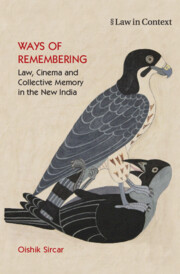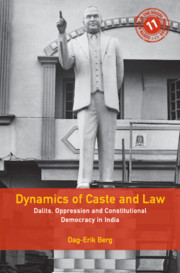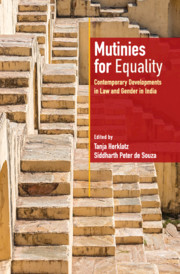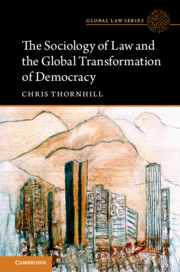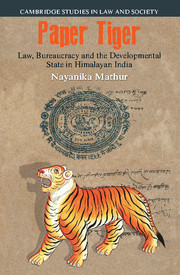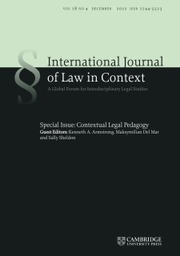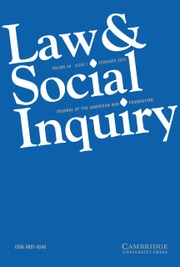Ways of Remembering
Law, Cinema and Collective Memory in the New India
Volume 1
Part of Law in Context
- Author: Oishik Sircar, O.P. Jindal Global University, India
- Date Published: July 2024
- availability: Available
- format: Hardback
- isbn: 9781316512814
Hardback
Other available formats:
eBook
Looking for an inspection copy?
Please email [email protected] to enquire about an inspection copy of this book
-
Ways of Remembering tells a story about the relationship between secular law and religious violence by studying the memorialisation of the 2002 Gujarat pogrom—postcolonial India's most litigated and mediatized event of anti-Muslim mass violence. By reading judgments and films on the pogrom through a novel interpretive framework, the book argues that the shared narrative of law and cinema engenders ways of remembering the pogrom in which the rationality of secular law offers a resolution to the irrationality of religious violence. In the public's collective memory, the force of this rationality simultaneously condemns and normalises violence against Muslims while exonerating secular law from its role in enabling the pogrom, thus keeping the violent (legal) order against India's Muslim citizens intact. The book contends that in foregrounding law's aesthetic dimensions we see the discursive ways in which secular law organizes violence and presents itself as the panacea for that very violence.
Read more- Jurisprudential study of the role of secular law in the making and ordering of collective memories of religious violence in contemporary India
- Will be of interest to readers interested in legal aesthetics, postcolonial studies, film studies, violence studies, and religious studies
- Will appeal to politically astute activists, journalists and generalist readers interested in larger questions of violence, secularism, representation and justice
Reviews & endorsements
'Ways of Remembering is an engrossing study of the interface between law and cinema in shaping the public memory of the 2002 Gujarat pogrom. It offers vital new insights into the spectacle of anti-Muslim violence that grounds the 'New India'. Sircar brilliantly and provocatively maps out the convergence between the ideologies of Hindutva and liberal Hindus, between religious hatred and neo-liberal governmentality to challenge the faith in secular constitutionalism as the solution to the anti-Muslim hatred that is now ubiquitous in India. This book is indispensable to understanding how national publics are mobilized in the contemporary rise of neoliberal fascisms in India, and around the world. It is an unforgettable read.' Sunera Thobani, University of British Columbia, Canada
See more reviews'The 2002 anti-Muslim Gujarat pogrom decisively advanced Hindutva's political fortunes and concomitantly its ideological appeal among a widening national public. A strikingly original study, Ways of Remembering is about how two sources—cinema and law—played their part in the construction of a pro-Hindutva collective memorialisation of that event. The best micro-studies always provide significant and powerful macro-level insights. Sircar's innovative 'jurisprudential aesthetic' method that examines three Bollywood films (that allude to the pogrom) and the chain of adjudication on one paradigmatically brutal case (the Best Bakery killings), can be situated in this tradition.' Achin Vanaik, University of Delhi, India
'Launching a dramatically innovative aesthetic jurisprudence, Oishik Sircar examines the art of memory through legal and cinematic reconstructions of a traumatic event. Generating layer upon layer of novelty, Ways of Remembering provides the inestimable intellectual service of breaking out of the Western legal episteme, and the dictates of planet Hollywood. Skilfully wielding an array of new filmic and legal techniques for engaging the past, this book scrutinises a massacre and its reconstruction, criminal act and legal trial, so as to evidence the power and impact of the lens through which events are framed and viewed.' Peter Goodrich, Cardozo School of Law, USA
'Rare is the shedding of new light on an historical event that has been thoroughly dissected, but Ways of Remembering does just that. Providing connective tissue between the current-day force of Hindutva with the Gujarat pogrom of 2002, Oishik Sircar brilliantly illuminates the reconstitution of violence through legal and cinematic narrative collusion. What emerges as well is an innovative approach to textual reading that generates novel questions and insights about memory making and the state. The result is a book about the past that is unexpectedly timely.' Jasbir K. Puar, Rutgers University, USA
Customer reviews
Not yet reviewed
Be the first to review
Review was not posted due to profanity
×Product details
- Date Published: July 2024
- format: Hardback
- isbn: 9781316512814
- length: 240 pages
- dimensions: 229 x 152 x 24 mm
- weight: 0.633kg
- availability: Available
Table of Contents
List of Figures
Acknowledgements
List of Abbreviations
1. Law and the Aesthetics of Atrocity
2. A Jurisprudential-Aesthetic Approach
3. The Best Bakery Judgments: Aesthetics of Judicial Memory
4. Bollywood's Law: Cinematic Justice and Collective Memory
5. 'As They Ought'
Notes
Glossary
Bibliography
Index.
Sorry, this resource is locked
Please register or sign in to request access. If you are having problems accessing these resources please email [email protected]
Register Sign in» Proceed
You are now leaving the Cambridge University Press website. Your eBook purchase and download will be completed by our partner www.ebooks.com. Please see the permission section of the www.ebooks.com catalogue page for details of the print & copy limits on our eBooks.
Continue ×Are you sure you want to delete your account?
This cannot be undone.
Thank you for your feedback which will help us improve our service.
If you requested a response, we will make sure to get back to you shortly.
×
